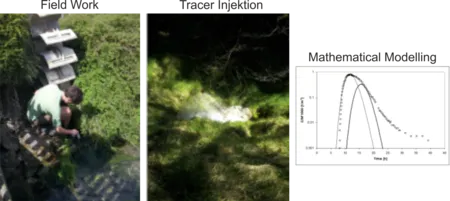Teaching Events
Following are selected teaching events that allow students to gain much practical experiences than lectures would provide.
Tracer Hydrogeology
A master student at TUM can select two different training courses in the field of tracer hydrogeology: An introductory course focusing on the properties of fluorescence dyes and the mathematical interpretation of tracer breakthrough curves by the application of a dispersion model (“Fluidpraktikum”), offered as a block course during the winter semester, and a more advanced course, where you learn how to apply the tracer technique in the field (“Tracer Experiments in Complex Hydrogeological Systems and Mathematical Modelling of Field Data”), which is given at the beginning of the summer semester.
During the advanced master course we will perform a field tracer experiment in the Franconian Alb Karst aquifer (South Germany). The scientific goals of the tracer experiment are:
- the hydraulic characterization of a heterogeneous karstic groundwater system,
- the determination of aquifer parameters such as water flow velocities, dispersion parameters, and the mean transit times of tracer below the ground by model application.
Filed Experiment with Students of TUM
The pictures above show a student during the field course. A fluorescence dye was directly injected into a large sinkhole of a karstic groundwater system. The detection of the tracer at several karst springs discharging a karstic catchment area was performed with online fluorescence data-loggers. Right figure shows a typical tracer breakthrough curve and a model fit with a dispersion model, which was obtained from a field-tracer test.
After you have participated in the two courses, you are able to prepare and perform both, tracer experiments in the laboratory, to characterize flow parameters in columns, as well as advanced tracer tests in complex hydrogeological flow systems. In addition, you are able to interpret the field and lab-data by the application of mathematical models.
Detailed information of the two master courses is provided under Geosciences at TUM
Selected field trips offered by the Chair of Hydrogeology
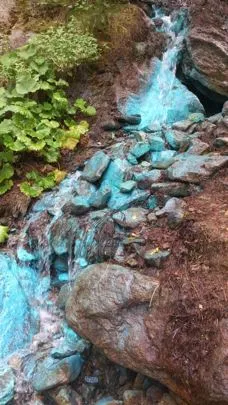
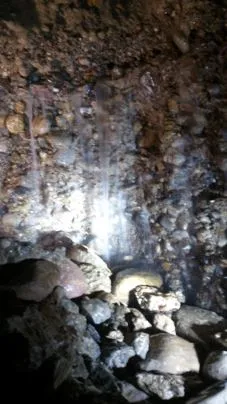
The Chair of Hydrogeology undertakes field trips to sites where you can learn more about hydrogeology and (bio)geochemistry. In 2015 students have joined the Chair of Hydrogeology to view the amazing settings of the Cu–Fe-sulphide mining district of Servette-Chuc (Saint-Marcel, Aosta Valley, Italy (left picture) and to learn more about groundwater flow in alpine regions (left: water supply of Zürich (CH)). Each year the Chair conducts field trips to hydro-geologic and mining points of interest. Led by university professors and local hydrogeologists these popular field trips are a unique opportunity to learn more about this interesting research field!
During the summer semester students, of the Chair of Hydrogeology will visit the alpine study site “Zugspitze” and the Environmental Research Station “Schneefernerhaus” together with Prof. Krautblatter (Landslides Group, TUM). The alpine study site and the “Schneefernerhaus” is an ideal area to monitor the physical and chemical properties of the atmosphere, to analyze various processes which influence the weather and climate, and to investigate temporal and spatial subsurface controls of permafrost-affected rock slope failure.
The pictures above show a group of students at the Environmental Research Station “Schneefernerhaus” during our field trip in 2013 (left side) and a snapshot of the permafrost tunnel of Zugspitze (right side), which is the highest mountain in Germany (2964 m).

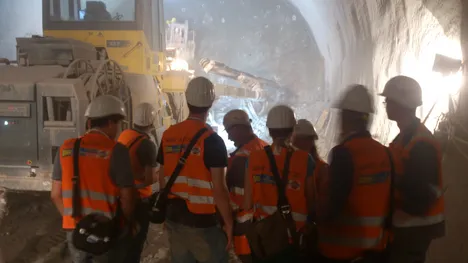
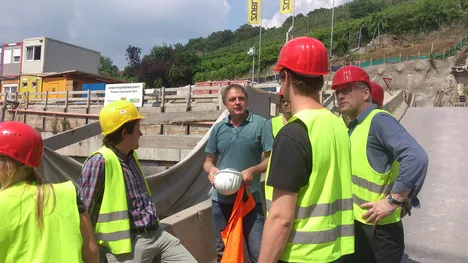
The monster tunneling below the streets of Stuttgart
The project called "Stuttgart 21" has a total budget of more than € 4 billion euro and is among the most challenging infrastructure projects of modern times. During this multidisciplinary field trip students got familiar with the geology, hydrogeology and water rights of this large-scale project. We visited several tunnels beneat h the streets of central Stuttgart to witness this enormous underground factory in action.
Hot springs of Wiesbaden
In addition we performed several trips to running hydrogeologial projects where students could gain practical experiences. For instance we visited the historical hot springs within the city of Wiesbaden, Germany. In this area the groundwater discharges at numerous springs throughout the city. During the field trip we have discussed the chemical characteristics of the groundwater and reviewed the results of stable and radioactive isotopes, the latter ones were used to understand the recharge area and the complex hydrogeology of this area. This field-trip is another excellent example of our multidisciplinary teaching activities at the Chair of Hydrogeology, where students gain much more practical experiences than lectures would provide. The field-trip was guided by Dr. Thomas Bauman (IWC) and Prof. Dr. Einsiedl, but other geologists, engineers and hydrogeologists from involved consulting companies supported the field trip with their project expertises. Next summer semester the staff of the Chair of Hydrogeology will be giving a tour to Switzerland and Italy and will be discussing recent research on groundwater. We hope that numerous students from TUM will participate!
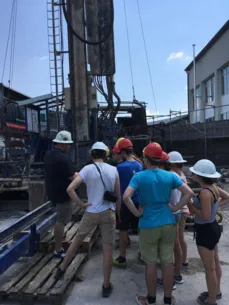
The field trip topic this year was the hydrogeology of Munich and Vienna and their drinking water supplies, the geothermal groundwater use in Bad Füssing including a visit of the geothermal drilling project (see picture), and the the visit of an in-situ remediation project of the DB. Under the supervision of Prof. Dr. Einsiedl and Dr. Thomas Baumann students have enjoyed the trip where they got some enhanced insight into water management strategies, geothermal energy use of groundwater and the application of water chemistry and environmantal isotopes in applied hydrogeology.


This year’s field trip touched on an array of scientific disciplines with visits to the Hot Springs of Combioula, the Mineral Springs of Chiavenna and a survey of the largest dam in Europe, the Grande Dixence-Dam in Switzerland. Under the supervision of the head of the Chair of Hydrogeology and Prof. A. Gilg students were particularly trained in the field of water chemistry, mineralogy and the use and interpretation of environmental isotopes in hydrogeology.
The courses are offered yearly and we are looking forward to welcome a new group of students next year. Additionally this course will be opened for external students, interested scientists around the world and local hydrogeologists who plan to use fluorescence dyes for groundwater tracing in the future (official announcement for 2024 is coming soon).
